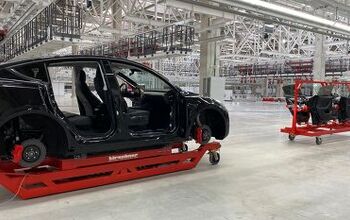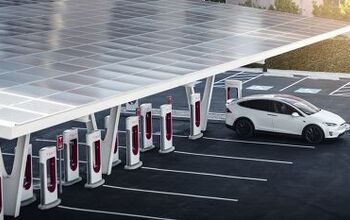Fiat Chrysler Offloads Magneti Marelli Parts Unit for $7.1 Billion

A key goal of Fiat Chrysler Automobiles’ financial fitness regimen, started under former CEO Sergio Marchionne, has come to pass under his successor, Mike Manley.
On Monday morning, FCA announced the sale of its Italian parts unit, Magneti Marelli, to Japan’s Calsonic Kansei, itself owned by KKR & Co. The deal, worth $7.1 billion, sees the parts unit don the name Magneti Marelli CK Holdings. It’s likely very good news if you’re an FCA shareholder.
In a joint statement, FCA and Calsonic Kansei said the acquisition, once approved, would create the world’s seventh largest independent automotive parts supplier. Magneti Marelli specializes in lighting, electronics, powertrain components, suspension parts, and exhaust.
“FCA has also agreed to a multi-year Supply Agreement that will further strengthen a mutually beneficial relationship for both Magneti Marelli and FCA’s expanding model range and which will sustain Magneti Marelli’s Italian business operations, positioning it strongly for continued growth and success in the future,” the automaker said.
Once the transaction closes in the first half of 2019, Calsonic Kansei CEO Beda Bolzenius will take the helm of the unified, Japan-based company. Current Magneti Marelli CEO Ermanno Ferrari will sit on the company’s board.
Marchionne had hoped to create a slimmer FCA, and shedding Magneti Marelli was at the top of that list. Early plans to spin off the parts unit collided with market storm clouds in Italy. Rather than threaten the company’s future with a stock listing, the automaker opted for an outright sale, potentially bringing a payday to FCA shareholders.
Joel Levington, a senior credit analyst at Bloomberg Intelligence, claims the sale might create $2 billion in dividends for investors.
“Having carefully examined a range of options to enable Magneti Marelli to express its full potential in the next phase of its development, this combination with Calsonic Kansei has emerged as an ideal opportunity to accelerate Magneti Marelli’s future growth for the benefit of its customers and its outstanding people,” said FCA CEO Mike Manley in a statement.
“The combined business will continue to be among FCA’s most important business partners and we would like to see that relationship grow even further in the future.”
Media reports from September claimed FCA wasn’t willing to drop below a $7 billion price tag in its negotiations with KKR, rejecting an earlier offer from the company.
[Image: Magneti Marelli]

More by Steph Willems
Latest Car Reviews
Read moreLatest Product Reviews
Read moreRecent Comments
- Jalop1991 In a manner similar to PHEV being the correct answer, I declare RPVs to be the correct answer here.We're doing it with certain aircraft; why not with cars on the ground, using hardware and tools like Telsa's "FSD" or GM's "SuperCruise" as the base?Take the local Uber driver out of the car, and put him in a professional centralized environment from where he drives me around. The system and the individual car can have awareness as well as gates, but he's responsible for the driving.Put the tech into my car, and let me buy it as needed. I need someone else to drive me home; hit the button and voila, I've hired a driver for the moment. I don't want to drive 11 hours to my vacation spot; hire the remote pilot for that. When I get there, I have my car and he's still at his normal location, piloting cars for other people.The system would allow for driver rest period, like what's required for truckers, so I might end up with multiple people driving me to the coast. I don't care. And they don't have to be physically with me, therefore they can be way cheaper.Charge taxi-type per-mile rates. For long drives, offer per-trip rates. Offer subscriptions, including miles/hours. Whatever.(And for grins, dress the remote pilots all as Johnnie.)Start this out with big rigs. Take the trucker away from the long haul driving, and let him be there for emergencies and the short haul parts of the trip.And in a manner similar to PHEVs being discredited, I fully expect to be razzed for this brilliant idea (not unlike how Alan Kay wasn't recognized until many many years later for his Dynabook vision).
- B-BodyBuick84 Not afraid of AV's as I highly doubt they will ever be %100 viable for our roads. Stop-and-go downtown city or rush hour highway traffic? I can see that, but otherwise there's simply too many variables. Bad weather conditions, faded road lines or markings, reflective surfaces with glare, etc. There's also the issue of cultural norms. About a decade ago there was actually an online test called 'The Morality Machine' one could do online where you were in control of an AV and choose what action to take when a crash was inevitable. I think something like 2.5 million people across the world participated? For example, do you hit and most likely kill the elderly couple strolling across the crosswalk or crash the vehicle into a cement barrier and almost certainly cause the death of the vehicle occupants? What if it's a parent and child? In N. America 98% of people choose to hit the elderly couple and save themselves while in Asia, the exact opposite happened where 98% choose to hit the parent and child. Why? Cultural differences. Asia puts a lot of emphasis on respecting their elderly while N. America has a culture of 'save/ protect the children'. Are these AV's going to respect that culture? Is a VW Jetta or Buick Envision AV going to have different programming depending on whether it's sold in Canada or Taiwan? how's that going to effect legislation and legal battles when a crash inevitibly does happen? These are the true barriers to mass AV adoption, and in the 10 years since that test came out, there has been zero answers or progress on this matter. So no, I'm not afraid of AV's simply because with the exception of a few specific situations, most avenues are going to prove to be a dead-end for automakers.
- Mike Bradley Autonomous cars were developed in Silicon Valley. For new products there, the standard business plan is to put a barely-functioning product on the market right away and wait for the early-adopter customers to find the flaws. That's exactly what's happened. Detroit's plan is pretty much the opposite, but Detroit isn't developing this product. That's why dealers, for instance, haven't been trained in the cars.
- Dartman https://apnews.com/article/artificial-intelligence-fighter-jets-air-force-6a1100c96a73ca9b7f41cbd6a2753fdaAutonomous/Ai is here now. The question is implementation and acceptance.
- FreedMike If Dodge were smart - and I don't think they are - they'd spend their money refreshing and reworking the Durango (which I think is entering model year 3,221), versus going down the same "stuff 'em full of motor and give 'em cool new paint options" path. That's the approach they used with the Charger and Challenger, and both those models are dead. The Durango is still a strong product in a strong market; why not keep it fresher?


































Comments
Join the conversation
Selling off is the beginning of the end for FCA. If they start to go into debt expect the worse. Get your Hellcat now!
The WORST parts on my late, lamented Volvo C70 were Magneti Marelli...stupid electronic throttle module bedeviled me for years. Italian electrical & electronic parts are not a much better idea than English parts (Lucas anyone?!?)